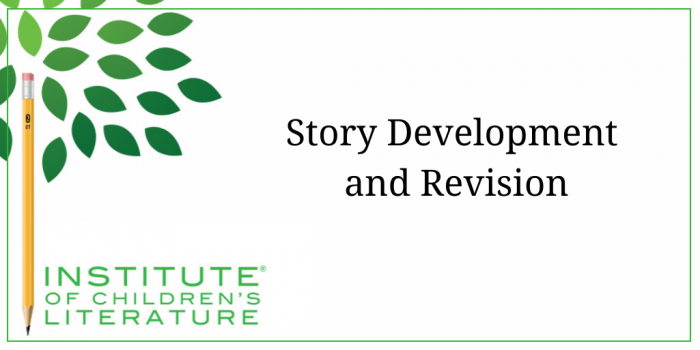1000 N. West Street #1200, Wilmington, DE 19801
© 2024 Direct Learning Systems, Inc. All rights reserved.

We teach our students how to write and get published!
View our Course Catalog >
For many writers, especially newer writers, revision is mainly a step for fixing typing errors, spelling errors and grammar mistakes. Some may have a checklist of things to look for such as overuse of pet words like “look” or “just.” Some may even do some last minute fact checking to make sure of dates or background events or the spelling of character names. And these are important things because small errors can throw a reader out of a story, especially when there are many of them. But revision isn’t just for fixing small errors. There can be a part of revision dedicated to story development as well, namely, checking to be sure your story is fully developed.
The Deep Dive
For experienced writers, revision goes well beyond clean up and begins to look very deeply at the story and the characters. Do the characters have a strong enough motivation for the things that they do? Are they changed by the events of the story? Is the story meaningful? One “truism” for most strong, memorable stories is that the events of the story and the choices the main character must make as a result will always change the character in some way. The change may point the character in a new direction as a person. A self-centered character may learn to relate to others. A frightened character may overcome his fears to save the day. But change can also fall into the “more of” category. The character may be pushed more deeply into who he is. So a generally brave, adventurous character may stay both of those things, but change in how he uses those traits and what he values. But a character who is unchanged by the story end is probably swimming around in a very shallow story that needs some extensive rewriting to work.
Refining and Sharpening Themes
In a strong well-written plot with real change in characters, it is almost impossible for a writer not to have themes arise organically from the story. A theme is simply the “truth” revealed by the story and the actions of a character. Theme is not plot. It is truth that may be applicable to many plots and many characters depending upon how they are handled. For example, a story where a character naturally begins to turn from selfish to empathetic will have themes about relationship and caring. But many writers take this revision step to search out the themes that are already emerging and polish them, adding nuance and possible symbolism to take the themes to the next level. A story with four boys who find themselves lost in the woods and dependent upon one another to survive will naturally grow themes about teamwork and possibly about friendship or empathy or selflessness or determination. It’s up to the author to look at the themes that are emerging and look for ways to make the organic emergence of these themes even cleaner so that they can be more meaningful to the reader. A writer may also want to be sure an emerging theme comes to some kind of conclusion. Your story seems to be trying to say something about friendship, you realize––but what? What actually happens to the friendships that are tested in the story and what do those events illustrate? Can you tweak them in small ways to make the final “truth” about friendship clear and clean within the story plot? Making themes clearer will help your story linger in the mind of the reader long after the story is done.
Keep in mind that any polishing you do to bring out themes, must be done without damaging the story. Revision to clarify theme, for instance, shouldn’t result in stopping the plot entirely while one character lectures another on the theme of the story. Bringing out the theme by bringing in a parent to “have a talk” with the character will nearly always weaken the strength of the theme (and your plot) and not strengthen it. Theme polishing is a subtle step because you must do no damage to the surrounding story as you polish and refine.
Snipping for Story Development
Sometimes revising for story development means eliminating things that weaken or distract from the story development. You might have a scene that you kept because of a funny line or because you wanted to include some side element, but you realize the scene doesn’t really move the story along and possibly brings in another thematic idea that you never illuminate anywhere else. For the sake of the story, you may choose to remove it. You might have a parent character who only wanders into the story to dish out good advice or give the character an idea of what to do next, but serves no other real purpose. Then the plot movement would probably benefit from using some other method to accomplish what you need and eliminating the pointless character. Yes, most children have parents, but they really don’t always need to appear in stories.
So as you head into revision, keep in mind that revision is a part of story development, or story refinement. You will refine all the ways your story told itself as you wrote. The more you refine, the better your story will be.
1000 N. West Street #1200, Wilmington, DE 19801
© 2024 Direct Learning Systems, Inc. All rights reserved.
1000 N. West Street #1200, Wilmington, DE 19801
© 2024 Direct Learning Systems, Inc. All rights reserved.
1000 N. West Street #1200, Wilmington, DE 19801
© 2024 Direct Learning Systems, Inc. All rights reserved.
1000 N. West Street #1200, Wilmington, DE 19801
© 2025 Direct Learning Systems, Inc. All rights reserved.
1000 N. West Street #1200, Wilmington, DE 19801
©2025 Direct Learning Systems, Inc. All rights reserved. Privacy Policy.
4 Comments